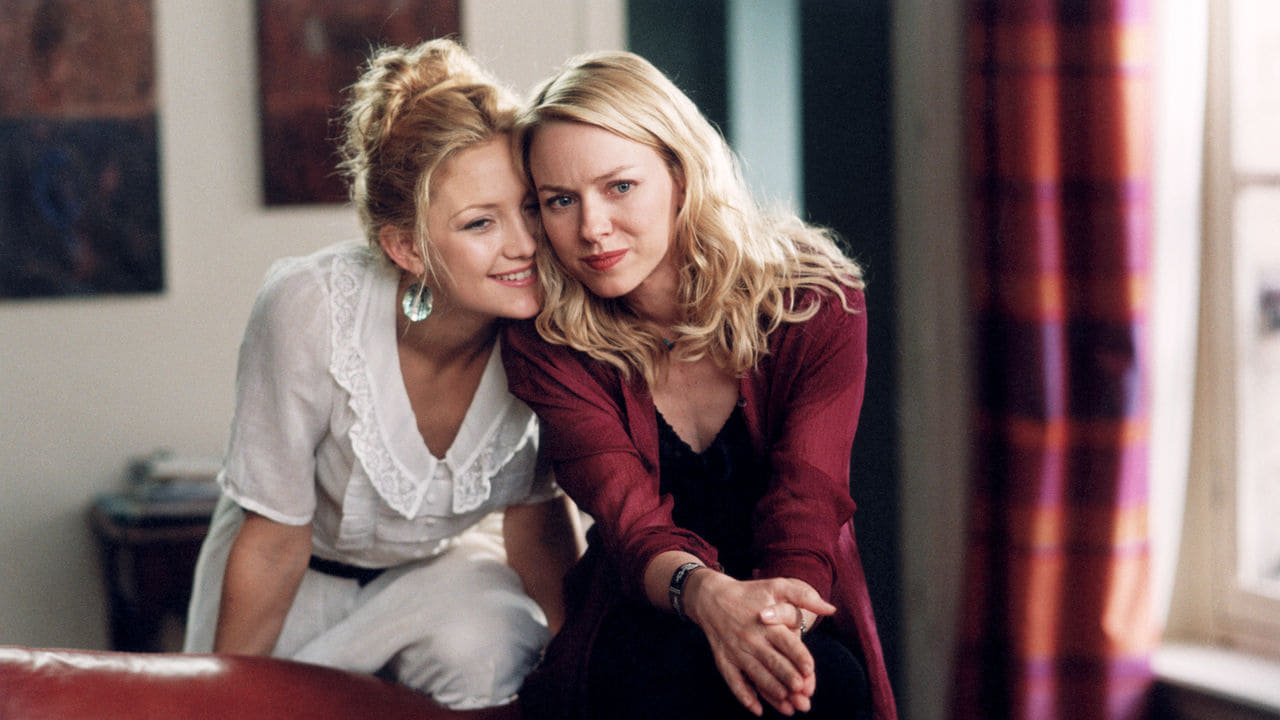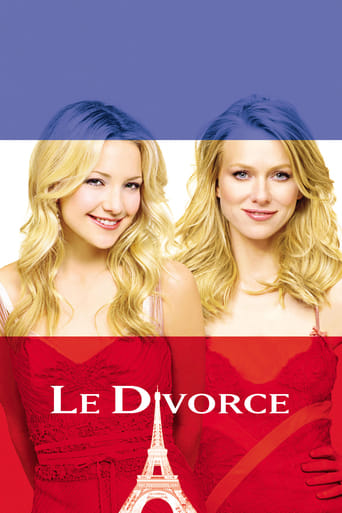

Crappy film
... View MoreAlthough it has its amusing moments, in eneral the plot does not convince.
... View MoreThe movie is wonderful and true, an act of love in all its contradictions and complexity
... View MoreGreat example of an old-fashioned, pure-at-heart escapist event movie that doesn't pretend to be anything that it's not and has boat loads of fun being its own ludicrous self.
... View MoreRoxeanne/Roxy (Naomi Watts) is an American in Paris. Pregnant, she is abandoned by her husband who decides he prefers his mistress, and the story unfolds as her family gets involved. Her sister Isabel (Kate Hudson) flies over to help her, the rest of her family hear about if from afar, and the husband's French side of the family try to deal with his mistakes and discuss how they can come out of the divorce on top, whilst avoiding the unspeakable subject of the affair.The tag-line for Le Divorce is "A comedy of manners...both good and bad." Unfortunately, Le Divorce isn't a comedy. It's a problem riddled drama that mishandles the big issues, has little respect for its characters and is far, far too long. It kicks off with a perfectly OK beginning, introducing us to some unlikeable people saying unlikeable things. Roxeanne's parents care more for a painting than the happiness of one of their daughters - "our girls are thousands of miles away from and they should be home with us. That's the essentials," one of them says, before the conversation swiftly returns to an expensive painting she has in her Paris home. The Americans in Le Divorce equally appear to be commodities to be retrieved from the French - Watts's character seems abandoned by those who should care for her beyond using her as a pawn to gain the upper hand.After finding out about his affair, Roxy rightly detests her husband, does not want to see him, even spend time in the same room as him, yet will not consider a divorce. It's almost as if the writer wants to continue to punish the character. She must be chastised for her American ideals in Paris, and indeed she does not get off lightly.The sister, now in Paris consoling her sister, then sees the husband kissing another woman in a bar, and her reaction is to smile and then chat with him amiably whilst he rationalises his affair in a stereotypical French way - "she should understand. She is a poet." Meanwhile, Roxy is pregnant and alone. It's impossible to tell what message the film is trying to get across - that all French men follow their heart at the expense of duty and honour? That a charming accent justifies all actions. Perhaps. The actions of Isabel, however, are impossible to justify and the film doesn't even try.First she decides to pursue the French uncle - why? A flirty line on liking "red meat," followed by a strange sideways transition in the editing and 3 minutes later she becomes his mistress, simultaneously continuing on a flirtatious courtship with a young Frenchman she slept with within a day or two of arrival. Meanwhile, as we know, Roxy is still pregnant and alone. The film is inherently shallow, glorying in its consumerism and appearances - opera, poetry recital, expensive paintings, designer handbags, lingerie, fine dining. The lack of confrontation is infuriating, revelations are merely glossed over, and nobody appears to say anything that an actual person would say dealing with these issues. The worst example of this is Roxy's failed suicide attempt, which is expertly glossed over. Isabel tells the family not to mention it, they don't, and Roxy, lying in a hospital bed with bandages on her wrist tells her husband that she blames herself for her decision making. Quick, move on, we have a great little scene with Stephen Fry as a Christie's buyer to get to! And off we go.The change of pace and time is also difficult to follow or justify. Whilst at the start, the film seems to be taking one day at a time, it begins to jump several days, perhaps weeks, between scenes without any visuals clues that we've moved forward. Occasionally an increasingly more pregnant Roxy is shown side on so we're aware of some time passing, but generally it's a mess. Things occasionally pick up with the few scenes afforded to Matthew Modine's character. He's the husband of the mistress of the husband of Roxeanne, who seems unstable enough to spark some life into the entire film. Sadly, as in the scene in the bookshop, he is quickly ushered out of the frame again, only to return for an improbably contrived finale with a gun on the Eiffel Tower.Yes, the weird ending - from drama to Hitchcockian suspense to a whimsical voice-over conclusion as the handbag, containing the gun, floats on the wind over Paris. It all feels a bit Sex and the City hearing Kate Hudson sum everything up into a neat little package. A horrible, superficial, meaningless package. And I hated it.
... View MoreLe Divorce is a romantic comedy based on Diane Johnson's bestselling novel about contemporary world of Americans in Paris.Kate Hudson lights up the screen as Isabel, a film school dropout who jets off to Paris when her pregnant step-sister Roxy,played by Naomi Watts,is abandoned by her husband. Stockard Channing, Glenn Close, Matthew Modine and Bebe Newirth co-star in this screenplay by Ruth Prawer Jhabvala and James Ivory,the film's director.When Isabel receives word that her pregnant poetess sister Roxy has been left by her philandering French husband, artist Charles-Henri de Persand ,she offers her help and moral support. As the depressive Roxy struggles with the separation proceedings, Isabel takes a job with author Olivia Pace and has a fling with the bohemian Yves. But things get complicated when the younger, more impudent sister decides instead to pursue Charles' uncle, the snooty, married diplomat Edgar, and when a mysterious man starts stalking Roxy. Eventually, the rest of the plucky Walker clan has to come to the aid of the siblings. This is an insignificant film with a passably entertaining premise that goes wildly to hell the instant it strays from its comic ideals with brief, unsatisfying detours into the realms of art and high-end lingerie.It was definitely an uneven film except that one can truly appreciate the performance of the cast particularly Hudson and Watts.
... View MoreThere's a definite 'curate's egg' feel about this one, not surprising given the melange of French, American and - to a lesser extent - English acting styles tossed in the blender then pressing the button marked 'hope' rather than the one marked 'perhaps not such a good idea'. The plot, such as it is, is kick-started when Melvil Poupaud, scion of an old French family, calls time on his marriage to Naomi Watts, who has (presumably) severed her American ties to live with him - and bear his children - in Paris. To lend support to her sibling, now pregnant again, Kate Hudson planes in from the US and is soon having sex with an arrogant kid, Romain Duris, and an older (55) sophisticated smoothie, Thierry Thermitte who, together with Watts, turns in the best performance in the film. There are other strands, not least the disputed ownership of a painting which Watts imported from her American 'family' home to France, plus parents in the respective shapes of Leslie Caron, Stockard Channing and Sam Waterson. it's all very light but just misses sufficient charm to raise a soufflé.
... View MoreThis is the worst movie i've ever seen in my life. Not only does the plot make no sense at all, Kate Hudson plays a dumb promiscuous woman who, instead of helping her recently divorced pregnant sister, spends all her time having an affair with an old pathetic man. It has no point. It tries to demonstrate how french people are despicable and arrogant, at the same time shows how Americans refuse to live in a culture which is different from theirs. It is described as a romantic comedy, but the whole movie is a complete tragedy. The beautiful Naomi Watts plays a women who is totally submissive and was no point to live. It had such a bad review in Brazil that it didn't even make it to the movies. It is probably one of the worst movies in these two ladies careers.
... View More